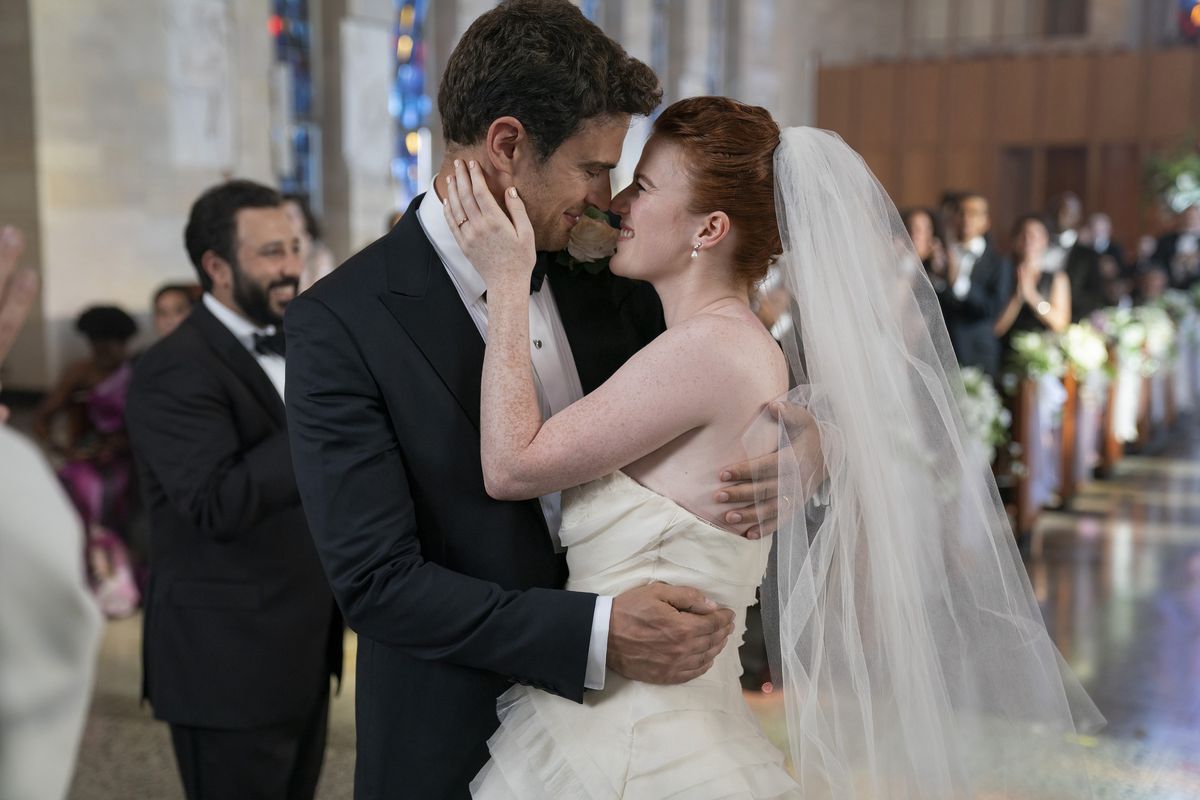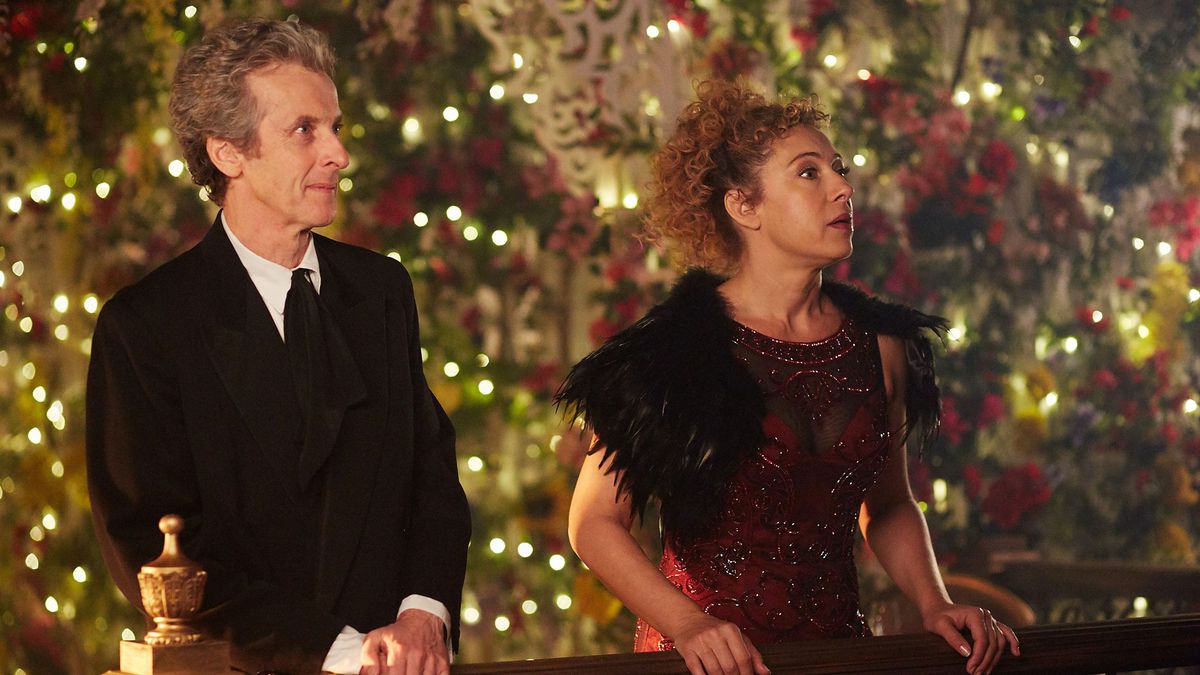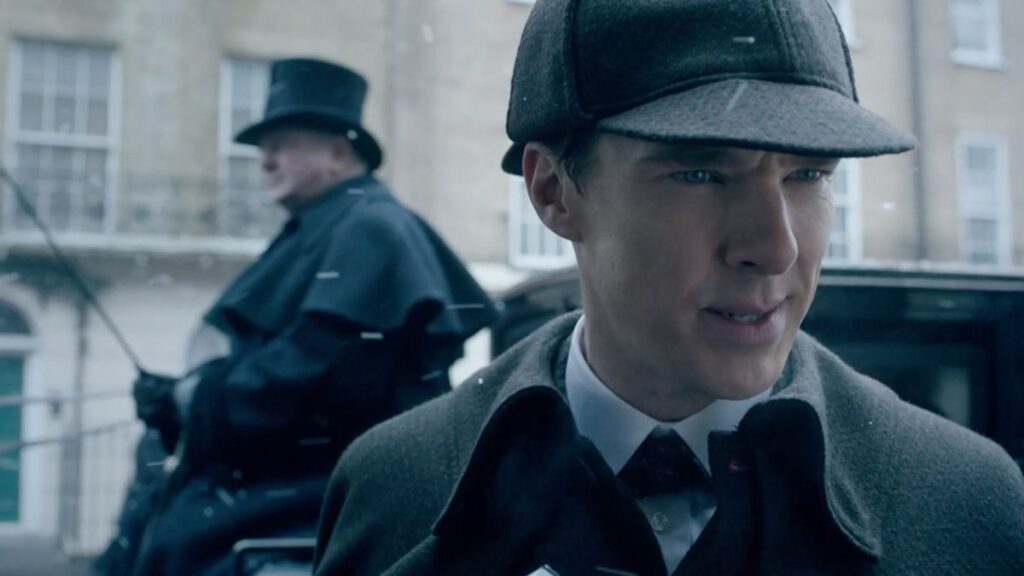Steven Moffat’s first Doctor Who story, situated near the end of the revived show’s first season, was a perfect blend of horror, adventure, and mystery, with a climax containing one of the show’s purest moments of joy. Watching the episode’s mysterious alien plague reverse course, Christopher Eccleston’s Ninth Doctor exclaims “everybody lives” as a crowd of people we were to believe had died were restored to life unharmed. This instance of overt, passionate sentimentalism resonated and in many ways set the tone for its writer’s whole career. A standout even amongst a great season, “The Empty Child” was the first of many stories Moffat would contribute to the new Who, including the now-iconic “Blink.”
It was moments like this that led to Moffat eventually being promoted to showrunner, replacing Russell T Davies and ushering in a new era with Matt Smith’s Eleventh Doctor. At the same time, Moffat was developing a Sherlock Holmes adaptation alongside Doctor Who regular Mark Gatiss. Sherlock would debut in July 2010, a few months after Moffat’s first season as Doctor Who’s showrunner premiered. The two shows ran parallel for the next seven years, riding and powering a wave of Anglophilia that had become incredibly trendy, and launching Steven Moffat to the kind of notoriety that few TV writers achieve. But it’s 2012 — the year Sherlock’s second season and Doctor Who’s seventh were released — that feels most representative of what was to come, a future that Moffat would be very much a part of ushering in and left behind by.
It would be an understatement to say that 2012 was a very different time on any axis, but the media landscape of a decade ago is starkly different than today, with not only different stories and stars populating conversation but the mechanisms of media production in general being practically unrecognizable. Breaking Bad had entered the first part of its final season as Game of Thrones was in its second, streaming content was almost a nonentity, Joe Biden turned out on Parks and Rec, The Walking Dead (then in just its second and third seasons) broke TV records, and the now quaint crossover of The Avengers quietly threatened to change everything.
As all this was happening, both Doctor Who and Sherlock were enjoying an unprecedented moment of success, bolstered by enormous online fandoms at a moment in time when that meant more than ever. Thanks to sites like Tumblr, Moffat had become something of a celebrity online, but that also meant that the often frantic fan bases of these shows knew exactly who to blame when they didn’t like how things were going. This was an era defined by a greater engagement between creatives and audiences than ever before, but that access also made criticism personal. Creatives were often lambasted as passionately as characters in their works. “Fucking Moffat!” was a familiar refrain online, and the idea of him as sadistically obsessed with killing and reviving characters had almost taken on a life of its own.
Photo: BBC
Though Doctor Who maintained relevance into its 50th anniversary year and Sherlock made a few more headlines, the stage was set for a pop culture dominated by micromanaged blockbuster franchises and self-conscious self-awareness that would spell the end of two weird BBC shows by an eccentric sentimentalist occupying any real place in pop culture.
It’s important to understand Moffat’s vision for these two shows in order to understand both the intense fandom around his shows and what happened next. Moffat’s Doctor Who certainly built on the revival’s formula of balancing monster-of-the-week adventures with overarching character work. But where Davies had leaned on grounded, human drama, Moffat’s show reveled in the fantasy, taking an approach to time travel that bordered on magical and framing Matt Smith’s Doctor more like a wizard than any kind of action hero. In this spirit, the show began to tell stories that were a million miles away from reality, incorporating strange ideas with very little interest in any idea of “the rules.” The show balanced Moffat’s often cruel snark with a commitment to presenting its characters’ emotions as profoundly important to an extent that is often no longer seen in these kinds of franchise stories for fear of being viewed as not in on the joke. This era of the show is often ridiculous but never insecure about that fact.
Moffat and Gatiss’ Sherlock was a different beast. Remembered most fondly now for making a star of Benedict Cumberbatch, the show loosely adapted Arthur Conan Doyle’s books as a stage for the soapy drama and melodramatic bickering that Moffat excelled at. At every turn the show experimented and rejected the expectations of the detective storytelling that its source material had defined and while often unsuccessful, it is every bit a product of its creators. Similarly, the show’s bizarre formal experimentation spurred on seemingly by excitement over access to new digital production tools is a far cry from the now firmly entrenched aesthetic of “prestige TV.” Sherlock is not a show people often revisit, but it is definitely one they remember.
What unites both of these shows is the sense of unmitigated excitement behind them. So many of their ideas are buoyed by the thought that something would be cool and everything is so strongly felt that it is rarely necessary to get bogged down by the specifics, though this is slightly more frustrating in a show ostensibly about solving mysteries. The streak of quirky, knowing nihilism that has emerged in the zeitgeist, embraced by an audience on their 50th fictional armageddon, is nowhere to be seen. This allowed Moffat et al to tell stories that foregrounded caring about things as the ultimate good and asked that even if we didn’t understand, we cared just as much.
Moffat shepherded Doctor Who into its 50th year, arguably the peak of its popularity before the departure of Matt Smith set the stage for a markedly more low-key stretch starring Peter Capaldi, who departed alongside Moffat in 2017. Sherlock had two more seasons, both less widely liked as audiences seemed to be increasingly less enamored with Moffat’s quirks, in tandem with the show leaning hard on its own somewhat tedious mythology. Though Moffat hadn’t stopped working, releasing a Dracula adaptation starring Claes Bang in 2020, pop culture had moved on.
Where it had moved to should be obvious. Mega-franchises like Marvel and Star Wars have come to dominate both niche and global conversations. While the snippy banter of Joss Whedon’s first Avengers movie fit neatly next to Moffat’s often equally harsh voice, the franchise surrounding it went in a very different direction. Where Doctor Who traded in stories that placed emotion first, the Marvel Cinematic Universe tends to lean on a level of aesthetic realism and formal straightforwardness that can feel as if it’s steering away from exploring its characters’ internal thoughts and feelings. Moments in Marvel movies can sometimes feel purely functional, an issue that the shows have only exacerbated by stretching those stories across twice the run time. Similarly, Star Wars — a franchise with all of Who’s potential to be weird and silly — has taken a turn into safety. The defining factor across all of this is not any particular creative impulse but the reality of what people come to these projects for: plainly delivered updates on a single story unimpeded by individual voices.
The unspoken promise behind the cinematic universe is that a franchise is more than any one work, that each entry is a window into another world and that the purpose of an artist is to hold it open. The side effect of this is that the worst thing an artist can do is offer their own perspective. Fandom relies on the platonic ideal of characters, internally consistent in a way that runs counter to the creative process, and it is perceived as an almost personal act of cruelty to go against that. Returning to Cumberbatch, a popular criticism of the recent Doctor Strange sequel is that Sam Raimi’s eccentricities as a filmmaker distract from the literal facts of the plot.

Photo: Barbara Nitke/HBO

Photo: BBC
It would be shortsighted to suggest that all criticisms of Steven Moffat are this baseless. His messy approach to writing women has been a point of contention for as long as he’s been doing it, with the playful invocations of misogyny feeling more misguided every time and perhaps hinting at why his sensibilities faded from the zeitgeist. On the other hand, that same sense of messy playfulness makes his frequent focus on LGBT representation feel oddly more sincere in the face of corporate coyness and “groundbreaking” background characters. Like many things in his shows, Moffat utilizes queerness because he thinks it’s fun above all else — something that, while far from a perfect approach, feels better than knowing you’re only being viewed as a marketable demographic. This messiness is something that defines Moffat’s approach. Of all the words that can be reasonably applied to his work, lazy is not one of them, and it makes similar attempts with those edges shaved off much harder to swallow.
Though we are supposedly in a heyday of “sincere” TV, very few shows have been as successful as Moffat’s in terms of actually providing narrative weight to their characters’ emotions. Many of the shows praised as emotionally honest or kind are constructed in a way that is fundamentally undramatic; these series quickly resolve conflict and steer away from strongly felt emotions in service of a comforting and understandably desirable relatability. Moffat’s shows, on the other hand, allow every emotion to be felt to an explosive extent, Doctor Who’s sixth season quite literally ending with a love felt so strongly it brings all of time to a halt. What sets Moffat’s shows apart from both the grandest and most intimate ends of the current state of pop culture is that they would never position any feeling or idea as unimportant, sometimes to their detriment.
This is not to say that Moffat’s impact has wholly disappeared. Shows like Doom Patrol revel in that same anarchic melodrama, while Moffat’s own adaptation of The Time Traveler’s Wife is making headlines for its unconventional approach to time travel storytelling. Benedict Cumberbatch has appeared in some of the biggest movies of all time, and Matt Smith’s talents are wasted on a regular basis. But that moment where fans were desperately theorizing how Sherlock survived falling from a hospital roof only to discover the specifics were never meant to matter — as a long as we felt that it happened — feels a million miles away from the status quo where we are privy to every detail of these fictional worlds and telling a story is treated like getting in the way.

